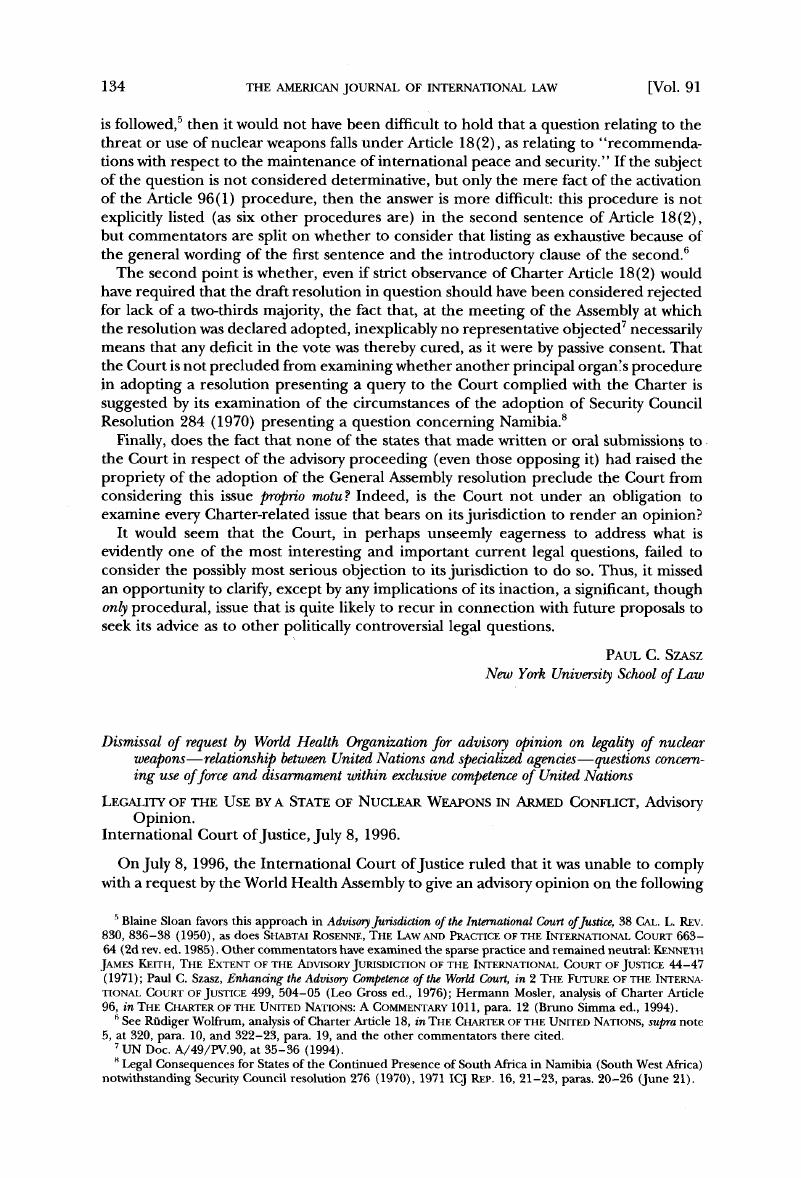Published online by Cambridge University Press: 27 February 2017

1 A letter from the Director-General of the World Health Organization officially communicating to the Court the decision taken by the World Health Assembly in its Resolution WHA46.40 of May 14, 1993, was received in the ICJ Registry on September 3, 1993. Resolution WHA46.40 was adopted by a vote of 73-40, with 10 abstentions. Forty-one states were absent from the voting. Written statements and comments were submitted to the Court by various states and public sittings were held between October 30 and November 15, 1995.
2 Judges Shahabuddeen, Weeramantry and Koroma appended dissenting opinions to the advisory opinion.
3 14 UNTS 185. Article 76 reads: “Upon authorization by the General Assembly of the United Nations or upon authorization in accordance with any agreement between the Organization and the United Nations, the Organization may request the International Court of Justice for an advisory opinion on any legal question arising within the competence of the Organization.”
4 19 UNTS 193.
5 Advisory Opinion, para. 11 [hereinafter slip op.].
6 Id., para. 16.
7 Id.
8 Article 96(2) reads: “Other organs of the United Nations and specialized agencies, which may at any time be so authorized by the General Assembly, may also request advisory opinions of the Court on legal questions arising within the scope of their activities.”
9 Slip op., para. 19.
10 Id., para. 21.
11 Id., para. 22.
12 Id., para. 25. The principle of speciality of an international organization qualifies the general principle of functional necessity according to which an international organization is endowed with such powers as are necessary for the exercise of its functions and the fulfillment of its purposes. Thus, the words “arising within the scope of their activities” in Article 96(2) of the UN Charter are an expression of the role that functional necessity plays in delineating the rights of international organizations. See Peter H. F. Bekker, The Legal Position of Intergovernmental Organizations—A Functional Necessity Analysis of Their Legal Status and Immunities (1994).
13 Slip op., para. 25. See also Bekker, supra note 12, at 68.
14 Slip op., para. 26.
15 Id.
16 Slip op., para. 28.
17 Id., paras. 14, 31.
18 Id., para. 29.
19 1949 ICJ Rep. 174 (Apr. 11).
20 1954 ICJ Rep. 47 (July 13).
21 1962 ICJ Rep. 151 (July 20). A more recent reference to the functional necessity principle may be found in the Court’s advisory opinion in Applicability of Article VI, Sectwn 22, of the Convention on the Privileges and Immunities of the United Nations. See 1989 ICJ Rep. 177 (Dec. 15).